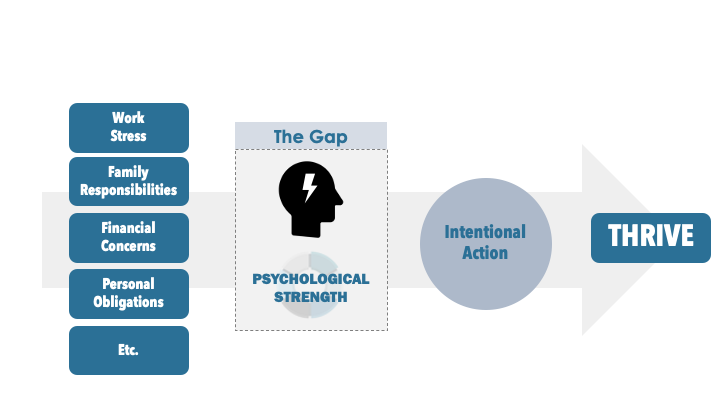WHAT IS PSYCHOLOGICAL STRENGTH?
What exactly is 'Psychological Strength,' and why is it such an important set of skills for your team to develop? This is the question we'll dive into in this post.
It probably comes as no surprise that our mind is the lens through which we experience and interact with the world. Every situation we encounter, favorable or challenging, is first run through our mind to help us interpret it and to set up our response to it.
Here's where things get interesting. In between our mind's intake of that situation and our response to it lies something we call 'The Gap.' The Gap represents all of the inner happenings whereby our mind is:
- Interpreting the situation
- Adding context
- Making predictions
- Generating an emotional response
- Crafting your next moves
Without Psychological Strength
Here's the issue: For most people, 'The Gap' is filled entirely with our mind's reactive thoughts and emotions. This reactivity runs on some of our mind's most basic processes, such as:
- Seeking out and finding threats in our environment (in an attempt to keep us safe)
- Predicting the future or other's behavior or thoughts (regardless of whether we're right about those predictions)
- Confirming our pre-existing beliefs (even if those beliefs are inaccurate)
- Relying on mental habits constructed long ago (that likely aren't helpful anymore)
When we rely solely on our mind's naturally-occurring, knee jerk thoughts and emotions, it's much more likely that our behavior will be reactive, leading to less optimal outcomes.

With Psychological Strength
But, here's the good news! When used correctly, 'The Gap' represents an opportunity. The opportunity to insert a new set of skills called 'Psychological Strength' that help dilute our mind's natural reactivity.
These skills don't happen naturally - they require training and practice (just like learning to swing a golf club or shoot free throws). But, the impact it has on the way we experience and interact with the world can't be understated.
It allows us to see the world in a less biased, more balanced way. To take intentional and effective action. It allows us to THRIVE instead of merely getting by.
Read on to learn more about the components of Psychological Strength.

What is Psychological Strength?
Psychological Strength is a set of knowledge and skills that have been shown to increase resilience, psychological flexibility, effective and intentional action, happiness, and thriving.
It includes skills in 6 areas:
- Mindfulness
- Emotions
- Thoughts
- Habits & Biology
- Relationships
- Self

All of Peak Mind's programs, workshops, and educational content focuses on these core areas to help people make meaningful shifts in their lives.
Take just a moment to imagine how you and your team could benefit from skills in these areas. How much more effective, engaged, and productive would you/they be? How would your culture improve? The impact really can't be understated.
Tool to Try
You're going to start building mindfulness skills by Minding the Gap.
This technique will help you begin to explore your mind's automatic reactions.
Think back to a recent difficult situation you experienced, particularly one in which your behavior was more reactive than you'd like. Really go there in your mind and recall the experience as vividly as you can.
Now Mind the Gap by mentally pressing pause and taking note of your internal reaction. What was going on inside of you before you reacted? Ask yourself these questions:
- What thoughts, assumptions, predictions or expectations were going through my mind?
- What emotions came up?
- What sensations can I notice in my body?
- What what actions did I feel urged or driven to do?
A core skill in psychological strength involves adding a mental 'speed bump' to these situations. An intentional pause whereby we observe our own internal experiences before we react.
Think ahead to an upcoming situation that you anticipate being difficult. Set the intention to Mind the Gap - pause to observe your own internal experience before saying or doing anything. Even 10 seconds of observation can make all the difference in the world. Resolve to do this each time you experience a difficult situation. The more you practice, the more second-nature it will become.


